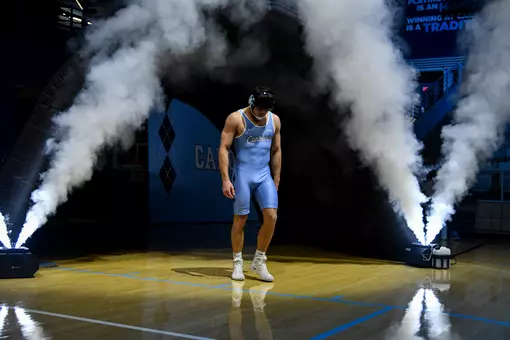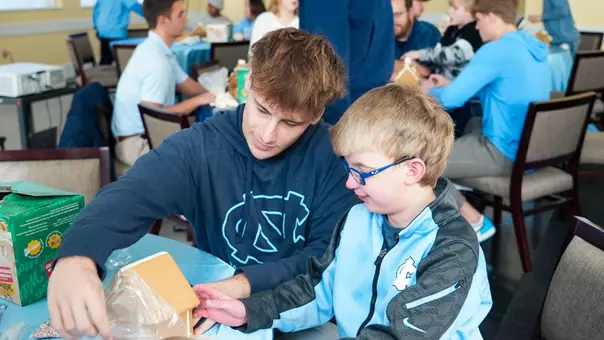University of North Carolina Athletics

Dr. Keia Sanderson
Black History Month: Building Bridges
February 1, 2022 | General
As a fifth grader in Charlotte, smart and speedy Keia Watkins laid out two goals for herself in a school essay: she wanted to become an Olympic champion and she wanted to become a doctor.
She came close on the first goal, competing in track and field at the DI level, and has absolutely crushed the second. Now Dr. Keia Sanderson, she's a pediatric nephrologist at UNC Hospitals and also serves as an assistant professor in the UNC School of Medicine.
Throughout the month of February, Carolina Athletics will commemorate Black History Month, which this year has a theme of Black Health and Wellness, by highlighting former student-athletes who are making an impact in the health care realm. Sanderson's own history helped nudge her toward the medical field, and now she pays that forward, volunteering in the community and mentoring UNC students, including Tar Heel student-athletes, who have their sights set on careers in health care.
Sanderson grew up in Charlotte and attended UNC track & field camps as a high school athlete, but after her family moved to College Station, Texas, she decided to attend Rice University, impressed by both its track & field and pre-med programs. She competed in sprints and in the high jump (she placed second in the state of Texas as a senior in high school) and earned all-conference honors in four different events. As a senior in 2005 she was the recipient of the Joyce Pounds Hardy Award, which goes to Rice's top female student-athlete, and earned a spot at the University of Missouri School of Medicine.
But before any of that, she was impacted by her own pediatrician, Dr. Deborah Scott, who still practices in Charlotte. As a Black woman, Scott gave young Keia concrete proof that her goal of becoming a doctor was achievable. "I think representation absolutely matters," Sanderson said. "I am a Black female former student-athlete who is now a physician. I was fortunate enough to see other Black female pediatricians and physicians who were either caring for me or that, as I got older, I had the opportunity to shadow, and that absolutely made a difference. For me it was proof that it was something I could do, because here's someone who looks like me or who has had similar life experiences than me who is doing this very thing."
After medical school she did her residency at the University of South Carolina and then a fellowship in Kansas City. When the opportunity to return to North Carolina arose in 2015, it felt like a homecoming. Sanderson had always hoped to move back to the state where her extended family still lived, so when a pediatric nephrology position opened up just as her she was finishing a fellowship in that field, she applied and was hired. "It felt like divine intervention," she said. "The timing worked out so well and they were looking for someone with clinical expertise in dialysis and that was my specialty, so it was just a unique position that I was honored to receive."
Now she takes advantage of opportunities to serve her community. (Follow her on Twitter at @drkeia to see some of the ways she helps amplify a variety of voices.) In addition to her clinical work and research at UNC, a teaching hospital with a mission of serving the state of North Carolina, she volunteers for education and outreach efforts both around the Covid-19 pandemic, which has hit the Black community particularly hard, and also in areas such as women's health and blood pressure screening. She's cognizant of the important impact that she, as a Black woman physician, can have. "Because I'm a Black woman and I grew up in the Black community, I draw on those experiences to have difficult conversations with Black patients who are making difficult decisions related to their health and well-being," she said. "I have insights into some of the fear and distrust that can happen navigating the healthcare system as a person of color. I'm open and honest and willing to have those conversations when they need it, when they're asking for it, and I think it makes a difference."
Other conversations are much more fun. She has young Black patients and young girls of all races marvel at the fact she's their doctor and she's also a Black woman and come to one conclusion: "So ... I can do this?"
Her emphatic answer? "Yes! You can!"
She has the same message for the college students she works with, and for student-athletes in particular. Balancing athletics and academics is challenging – add to that the requirements of preparing for medical school or any other health career and the task becomes even more daunting. But just as Dr. Scott showed Sanderson what was possible, Sanderson now can use her own journey as Exhibit A. "I love sharing my experience with fellow student-athletes because I think it helps with reassurance, knowing that I was once in your shoes," she said. "And in the training process I've had the opportunity to see that things that I did in my career as a track and field student-athlete are very useful skills and transferred into what I'm doing as a physician."
In addition to mentoring UNC students, she serves on the Faculty Athletics Committee, which collaborates to advise the chancellor and represent the faculty on the UNC experience of Tar Heel student-athletes and the athletic program as a whole. She is an active mentor in the PATH-Med program, which guides UNC student-athletes as they work toward careers in health care.
Sanderson appreciates the poem "The Bridge Builder," by Will Allen Drumgoole, in which a man builds a bridge over a chasm he's already crossed in order to help those who will come behind him. "That's kind of how I live my life," she said. "I am hopefully building bridges for people who are interested in health-related careers in medicine behind me. If there are ways I can make the path easier for those who are coming behind me, I'm happy to help.
"I do love the way it's come full-circle – my pediatrician happens to still be practicing in Charlotte so of course I've reached out to her to say thank you for all she did to me in modeling what it's like to be a pediatrician and a Black woman. I'm happy to be here at UNC and to hopefully make a difference, but also careful to be very humble about the position I'm in, to have the opportunity to help support the greater North Carolina community. It's an honor and a privilege, and I don't take it lightly."
She came close on the first goal, competing in track and field at the DI level, and has absolutely crushed the second. Now Dr. Keia Sanderson, she's a pediatric nephrologist at UNC Hospitals and also serves as an assistant professor in the UNC School of Medicine.
Throughout the month of February, Carolina Athletics will commemorate Black History Month, which this year has a theme of Black Health and Wellness, by highlighting former student-athletes who are making an impact in the health care realm. Sanderson's own history helped nudge her toward the medical field, and now she pays that forward, volunteering in the community and mentoring UNC students, including Tar Heel student-athletes, who have their sights set on careers in health care.
Sanderson grew up in Charlotte and attended UNC track & field camps as a high school athlete, but after her family moved to College Station, Texas, she decided to attend Rice University, impressed by both its track & field and pre-med programs. She competed in sprints and in the high jump (she placed second in the state of Texas as a senior in high school) and earned all-conference honors in four different events. As a senior in 2005 she was the recipient of the Joyce Pounds Hardy Award, which goes to Rice's top female student-athlete, and earned a spot at the University of Missouri School of Medicine.
But before any of that, she was impacted by her own pediatrician, Dr. Deborah Scott, who still practices in Charlotte. As a Black woman, Scott gave young Keia concrete proof that her goal of becoming a doctor was achievable. "I think representation absolutely matters," Sanderson said. "I am a Black female former student-athlete who is now a physician. I was fortunate enough to see other Black female pediatricians and physicians who were either caring for me or that, as I got older, I had the opportunity to shadow, and that absolutely made a difference. For me it was proof that it was something I could do, because here's someone who looks like me or who has had similar life experiences than me who is doing this very thing."
After medical school she did her residency at the University of South Carolina and then a fellowship in Kansas City. When the opportunity to return to North Carolina arose in 2015, it felt like a homecoming. Sanderson had always hoped to move back to the state where her extended family still lived, so when a pediatric nephrology position opened up just as her she was finishing a fellowship in that field, she applied and was hired. "It felt like divine intervention," she said. "The timing worked out so well and they were looking for someone with clinical expertise in dialysis and that was my specialty, so it was just a unique position that I was honored to receive."
Now she takes advantage of opportunities to serve her community. (Follow her on Twitter at @drkeia to see some of the ways she helps amplify a variety of voices.) In addition to her clinical work and research at UNC, a teaching hospital with a mission of serving the state of North Carolina, she volunteers for education and outreach efforts both around the Covid-19 pandemic, which has hit the Black community particularly hard, and also in areas such as women's health and blood pressure screening. She's cognizant of the important impact that she, as a Black woman physician, can have. "Because I'm a Black woman and I grew up in the Black community, I draw on those experiences to have difficult conversations with Black patients who are making difficult decisions related to their health and well-being," she said. "I have insights into some of the fear and distrust that can happen navigating the healthcare system as a person of color. I'm open and honest and willing to have those conversations when they need it, when they're asking for it, and I think it makes a difference."
Other conversations are much more fun. She has young Black patients and young girls of all races marvel at the fact she's their doctor and she's also a Black woman and come to one conclusion: "So ... I can do this?"
Her emphatic answer? "Yes! You can!"
She has the same message for the college students she works with, and for student-athletes in particular. Balancing athletics and academics is challenging – add to that the requirements of preparing for medical school or any other health career and the task becomes even more daunting. But just as Dr. Scott showed Sanderson what was possible, Sanderson now can use her own journey as Exhibit A. "I love sharing my experience with fellow student-athletes because I think it helps with reassurance, knowing that I was once in your shoes," she said. "And in the training process I've had the opportunity to see that things that I did in my career as a track and field student-athlete are very useful skills and transferred into what I'm doing as a physician."
In addition to mentoring UNC students, she serves on the Faculty Athletics Committee, which collaborates to advise the chancellor and represent the faculty on the UNC experience of Tar Heel student-athletes and the athletic program as a whole. She is an active mentor in the PATH-Med program, which guides UNC student-athletes as they work toward careers in health care.
Sanderson appreciates the poem "The Bridge Builder," by Will Allen Drumgoole, in which a man builds a bridge over a chasm he's already crossed in order to help those who will come behind him. "That's kind of how I live my life," she said. "I am hopefully building bridges for people who are interested in health-related careers in medicine behind me. If there are ways I can make the path easier for those who are coming behind me, I'm happy to help.
"I do love the way it's come full-circle – my pediatrician happens to still be practicing in Charlotte so of course I've reached out to her to say thank you for all she did to me in modeling what it's like to be a pediatrician and a Black woman. I'm happy to be here at UNC and to hopefully make a difference, but also careful to be very humble about the position I'm in, to have the opportunity to help support the greater North Carolina community. It's an honor and a privilege, and I don't take it lightly."
UNC Men's Basketball: Tar Heels Escape Ohio State, 71-70
Saturday, December 20
Tar Heels in the Community pres. by NC Electric Co-ops - Share Your Holiday 2025 - December 18, 2025
Thursday, December 18
WBB: Post-UNCW Press Conference - Dec. 17, 2025
Thursday, December 18
UNC Women's Basketball: Brooks, Toomey Blow Heels Past UNCW, 84-34
Thursday, December 18




